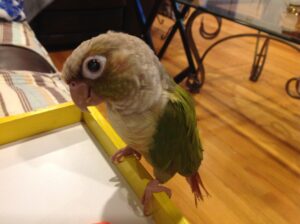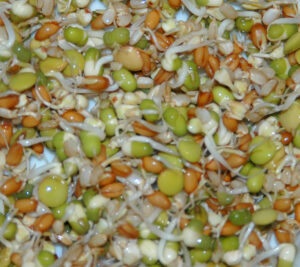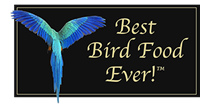What commonly fed foods should never be given to parrots?
Red palm oil, dog and cat food, all parrot pellets, all synthetic bird vitamins, all food colorings, all non-organic foods, all dried (freeze dried, dehydrated foods), and all foods high in omega-6 essential fatty acids. Never feed these foods to parrots – as you will learn in Kiwi’s story.
.
“I wanted to share Kiwi’s story in part to help me heal from his loss, but also to encourage other bird owners to become more aware of the important link between nutrition and the development of diseases, which may be prevented or perhaps even reversed by feeding a proper diet backed by scientific research. It is my hope that our story will save other precious lives.” — Mary, Kiwi’s Caregiver
.

Kiwi, a Pineapple Green-cheeked conure.
Kiwi’s Story
Kiwi was a wonderful Green-cheeked conure who Mary loved very much. When I received Mary’s application for the Healthy Bird Project I was deeply touched by what she told me about her bird, Kiwi who passed away on January 30, 2022, from gout and kidney disease. The article: More Foods Not to Feed Parrots, explains the diet Kiwi had been fed and I provide an analysis of the nutritional problems of these foods.
After reading about my avian nutritional work that uses whole, real foods to heal our parrots and finches, and prevent illness and disease, Mary emailed me. This article is intending to educate parrot lovers, and with the hope of preventing what happened to Mary and Kiwi from happening to others.
.
.
.
This is what Mary wrote me about Kiwi
“My male Green Cheek Conure (Pineapple mutation), named Kiwi, just passed away from gout and kidney failure at the age of 16. I got him from a rescue 5 years ago. Kiwi had cataracts in both eyes and suffered from seizures. He was on ketoralac eyedrops and an oral heart medication for the seizures. He had a medical checkup and blood work at the end of October, and his weight and test results were good with no signs of gout.”
.
When illness and diseases start to occur this is often a sign that some part of the diet is not meeting a bird’s nutritional needs. After reviewing the foods in the diet of Kiwi, this sad story is but one example of common foods that no one should give to parrots of any size.
.
Feeding My New Bird
Mary explained, “After Kiwi passed away on January 30th, I am hoping to get a baby cockatiel from a breeder 2-3 months from now. I would like details, from you Leslie, on how to feed your balanced diet, the foods included and amounts to feed to my new bird.”
.

Kiwi, a Pineapple Green-cheeked conure.
More About Kiwi
In a few more emails to me Mary explained, “I’m deeply saddened by his loss. It was very sudden, and I never expected I would be going home from the vet’s office without him. Our five years together was not enough time.”
“I adopted him from a bird rescue in February 2017 and was told he was 2 years old. My vet said that his leg band indicated that he was actually hatched in 2006. Kiwi was very skittish and kept his head bowed low a lot. He was very nippy and didn’t seem to know how to play with toys, which made me suspect he might have been a retired breeder bird. It took a long time for me to earn his trust.”
“The second week I had him, I noticed he was starting to develop a cataract in one eye. Not too long after that, his other eye developed one also. I was afraid that the BRANDNAME lamp and UV bulb I was using on a timer for 6 hours a day might have caused the damage to his eyes. I reduced the timer on the lamp to 4 hours a day, and then I stopped using it altogether after a few more months. The vet prescribed the Ketorolac eyedrops, which he remained on for the duration of his life.”
More on UV lighting in a future blog post.
.
“Around April or May 2020, Kiwi had 2 seizures that I witnessed and I took him to the vet. When his blood work and fecal test results came back, she prescribed Pentoxyfilline for suspected atherosclerosis to be taken for the rest of his life. She also took 2 X-rays during this visit. The seizures seemed to occur every 4 months. I have no way of knowing if any occurred in the middle of the night.”
“Kiwi’s last vet visit before he passed on January 30th was on October 25, 2021. [A veterinarian conducted our] annual blood work, and the lab results were good.”
.

Best Bird Food Ever! complete protein sprouting blend at 3 days growth, ready to eat.
Mary Did Her Best
Mary told me, “I did try feeding your sprout mix, but he never ate it. He also preferred dry foods over moist. I tried giving him a variety of steamed vegetables which he had no interest in. He seemed to only like the occasional fresh fruit. Of course, I really couldn’t tell exactly what he was eating and how much. I also kept a Manu Mineral Block in his cage.”
.
I explained to Mary that malnutrition often can cause a parrot to become stuck in a cycle of eating unhealthy foods.
This occurs in a manner very similar to when a person becomes addicted to junk foods, and only wants more empty- nutrition high-calorie foods. Chapter 13 in my book, “Polly Want a Sprout?” sheds more light on the problem of food addiction in parrots, while also introducing many aspects for helping readers be successful when introducing new healthier foods to parrots. This book also explains why many commonly fed foods should never be fed to birds.
.
Mary further explained, “We have come a long way in regard to avian medicine, but as far as nutrition is concerned, we are still fumbling around in the dark and using guesswork instead of science. Many veterinarians strongly advocate the feeding of pellets, which leads pet owners to believe they are doing their beloved birds a disservice and jeopardizing their health if they do not feed them as part of their diets.
I also realize that veterinarians are not well-versed in avian nutrition, and very little research has been done on this important subject. It’s very frustrating and I did the best I could, but I can’t help feeling that it wasn’t good enough.” — Mary, Kiwi’s Caregiver
.
.
A Great Idea
After reading all of Mary’s emails about Kiwi I asked her permission to write this two-part articles series on her experience. Mary told me she thought it was a great idea!
Thank you Mary for letting me share your experience of how foods commonly fed parrots shortened the life of your precious conure Kiwi.
I look forward to helping your new bird to have a long, happy and healthy life with you.
.
![]()
.
Build your bird’s health. Avian malnutrition is always a medical emergency.







